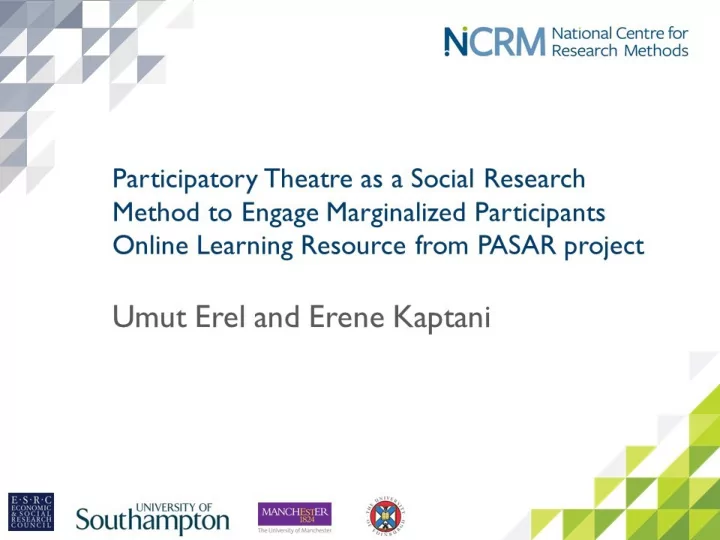

This presentation is based on our research project Participatory Action Research (PAR): Participatory Theatre and Walking Methods' Potential for Co-producing knowledge with Migrant families PI: Dr Umut Erel, The Open University CI: Professor Maggie O’Neill, University of York CI: Professor Tracey Reynolds, University of Greenwich Research Fellow: Erene Kaptani, The Open University
In this project we worked with 3 groups: a) Migrant mothers b) girls from migrant families c) Black migrant mothers with No Recourse to Public Funds to look at how these methods • generate research data, • engage participants in dialogue with other social groups • policy makers and practitioners in an integrated way from research, to dissemination.
We collaborated with Counterpoints Arts , Praxis, RENA ISI, The Runnymede Trust For more resources see http://fass.open.ac.uk/research/projects/pasar
Participatory Performance Practice (Kaptani, 2005-2017) - Playback Theatre, drawing on Jonathan Fox - Forum Theatre, drawing on Augusto Boal - Psychosocial exercises including: -Physical theatre exercises of everyday movements and interactions, -emotion based mapping of the participants’ localities, - ‘Talking to the Policy Panel’
Participatory Theatre methods emphasise dialogic, performative and embodied ways of knowing (Kaptani & Yuval-Davis 2008) • the exploration of research questions pertaining to lived experiences which are difficult to verbalize, such as experiences of discrimination, which may be conveyed through bodily postures and gazes. (Erel/Reynolds/Kaptani,2017)
- Augusto Boal (1979) developed Forum Theatre as part of the Theatre of the Oppressed, - based on principles of collective empowerment and emancipation by Paulo Freire, theorist and practitioner of the Pedagogy of the Oppressed.
Forum Theatre is useful: • to reflect on the social construction of reality • to Identify social structures which lead to oppressions • to try out interventions for social action • to validate participants’ local, subjugated knowledge .
Challenges of using participatory theatre for social research • Working across academia and participatory arts’ different practices. • In Forum Theatre it is important not to simplify analysis of power or oppression to interpersonal relationships or individualise social problems and their solution. • Ensuring that participants are invited to give shape to the themes and issues they want to explore in order to avoid a hegemonic gaze which casts them only as having problems.
Participatory Theatre Methods contribute embodied, dialogic and affective knowledges to social • research. hold the potential to articulate subjugated knowledges • collectively through research dissemination can reach wider audiences. • participants can co-produce knowledge about themselves and • contribute to developing policy and practice about the issues affecting them.
Recommend
More recommend